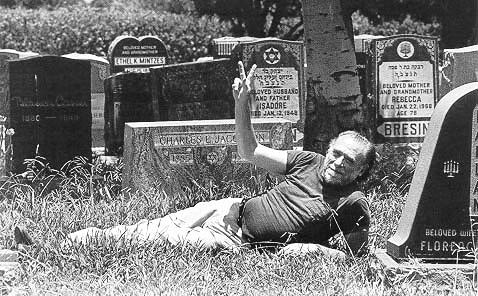3rd ANNUAL NAPOMO 30/30/30 :: DAY 25 :: M. KROCHMALNIK GRABOIS on CHARLES BUKOWSKI :: John Fante Was L.A. and Bukowski Was L.A. and I Am L.A.

[box]Editor’s note: Sometime early this year, I’d been corresponding with a new contributor about the upcoming print magazine, and invited him to submit a piece for this year’s series. This contributor was M. Krochmalnik Grabois, and what was to follow was something editors (especially former educator-editors, like this one) daydream about: the project sparked deeper inquiry than its initial bounds, and spawned instead a longer work — some 26 pages of poesis and prose, memories and thoughts of, in, and around Bukowski, which he titled “John Fante was L.A. and Bukowski was L.A. and I am L.A.” — and which I’ve included as an ISSUU e-book, readable (and downloadable) within this post. I’m grateful to Grabois, to Bukowski, and to the moment of foment that this project has brought to so many. Happy, as always, to be a conduit for these productive energies.
You’ll find here a few words on the process, and both “preface” and “postscript” poems from Bukowski, teasers for those of you who can’t immediately commit to the longer text. I encourage you heartily to download or return to it – for, truly: what a gift this piece is. Enjoy![/box]
[line]
1. The Operating System’s editor, Lynne DeSilva-Johnson, asked me to write an introduction to this piece on Bukowski, describing the process of writing it, and conveying what I hope the reader will take away. I normally don’t like to provide any explanation of my work. As a writer, I live in my subconscious, and explaining how material moves from my subconscious into the world we share is best left to a psychologist. However, out of respect for Lynne, I will make a stab at it.
Some years ago, when not yet an adult, I totaled a car. Shards of glass embedded themselves in my left hip. They could not be surgically removed, and gradually worked themselves out. Sometimes I would wake up to find glass and blood on my sheets.
In writing this piece, shards of my childhood, shards of Bukowski, of L.A., family and friends, worked their way to the surface and arranged themselves in a rough composition.
2. For a long time I only read Bukowski’s fiction, especially his short stories. Erections, Ejaculations, Exhibitions and General Tales of Ordinary Madness was a bible of decadence and self-denigration.
I discovered Bukowski’s softer side when I began reading his poetry. When The Pleasures of the Damned, poems, 1951-1993, came out in 2007, “the definitive volume of Bukowski’s poems,” (NYT Book Review) I had a new bible to consult. The preface and postscript of this piece, along with the shorter extracts, are drawn from that book.
My hope is that, as a reader, you will find my acquaintance not too much of an imposition, and will feel eager to move on from the small sample of Bukowski’s poetry contained here, to delve more deeply into the man’s poetic work.
[line]
[h5]PREFACE:[/h5]
[box]for they had things to say
by Charles Bukowski
the canaries were there, and the lemon tree
and the old woman with warts;
and I was there, a child
and I touched the piano keys
as they talked—
but not too loudly
for they had things to say,
the three of them;
and I watched them cover the canaries at night
with flour sacks;
“so they can sleep, my dear.”
I played the piano quietly
one note at a time,
the canaries under their sacks,
and there were pepper trees,
pepper trees brushing the roof like rain
and hanging outside the windows
like green rain,
and they talked, the three of them
sitting in a warm night’s semicircle,
and the keys were black and white
and responded to my fingers
like the locked-in magic
of a waiting, grown-up world;
and now they’re gone, the three of them
and I am old:
pirate feet have trod
the clean-thatched floors
of my soul,
and the canaries sing no more.
[/box]
[h5]POSTSCRIPT[/h5]
[box]mind and heart
by Charles Bukowski
unaccountably we are alone
forever alone
and it was meant to be
that way,
it was never meant
to be any other way—
and when the death struggle
begins
the last thing I wish to see
is
a ring of human faces
hovering over me—
better just my old friends,
the walls of my self,
let only them be there.
I have been alone but seldom
lonely.
I have satisfied my thirst
at the well
of my self
and that wine was good,
the best I ever had,
and tonight
sitting
staring into the dark
I now finally understand
the dark and the
light and everything
in between.
peace of mind and heart
arrives
when we accept what
is:
having been
born into this
strange life
we must accept
the wasted gamble of our
days
and take some satisfaction in
the pleasure of
leaving it
behind.
cry not for me.
grieve not for me.
read
what I’ve written
then
forget it
all.
drink from the well
of your self
and begin
again.
[/box]
[line]
[textwrap_image align=”left”]http://www.theoperatingsystem.org/wp-content/uploads/2014/04/images-1.jpeg[/textwrap_image]M. Krochmalnik Grabois’ poems have appeared in hundreds of literary magazines in the U.S. and abroad. He is a regular contributor to The Prague Revue, and has been nominated for the Pushcart Prize, most recently for his story “Purple Heart” published in The Examined Life in 2012, and for his poem. “Birds,” published inThe Blue Hour, 2013. His novel, Two-Headed Dog, based on his work as a clinical psychologist in a state hospital, is available for 99 cents from Kindle and Nook, or as a print edition.
[line]
[recent_post_thumbs border=”yes”]


